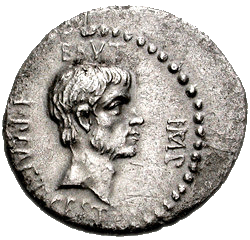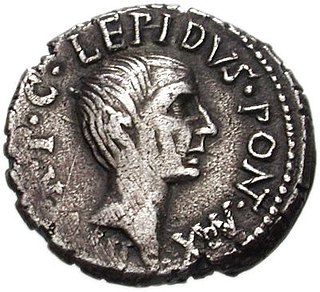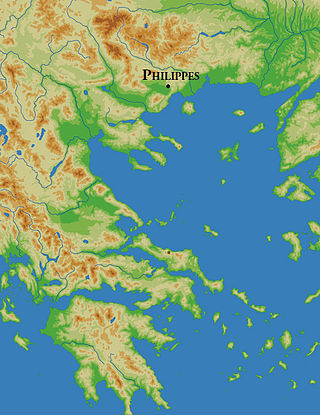Related Research Articles

Marcus Antonius, commonly known in English as Mark Antony, was a Roman politician and general who played a critical role in the transformation of the Roman Republic from a constitutional republic into the autocratic Roman Empire.

This article concerns the period 49 BC – 40 BC.
Year 40 BC was either a common year starting on Thursday, Friday or Saturday or a leap year starting on Thursday or Friday of the Julian calendar and a common year starting on Friday of the Proleptic Julian calendar. At the time, it was known as the Year of the Consulship of Calvinus and Pollio. The denomination 40 BC for this year has been used since the early medieval period, when the Anno Domini calendar era became the prevalent method in Europe for naming years.

Marcus Junius Brutus was a Roman politician, orator, and the most famous of the assassins of Julius Caesar. After being adopted by a relative, he used the name Quintus Servilius Caepio Brutus, which was retained as his legal name. He is often referred to simply as Brutus.

The Second Triumvirate was an extraordinary commission and magistracy created for Mark Antony, Marcus Aemilius Lepidus, and Octavian to give them practically absolute power. It was formally constituted by law on 27 November 43 BC with a term of five years; it was renewed in 37 BC for another five years before expiring in 32 BC. Constituted by the lex Titia, the triumvirs were given broad powers to make or repeal legislation, issue judicial punishments without due process or right of appeal, and appoint all other magistrates. The triumvirs also split the Roman world into three sets of provinces.

Marcus Aemilius Lepidus was a Roman general and statesman who formed the Second Triumvirate alongside Octavian and Mark Antony during the final years of the Roman Republic. Lepidus had previously been a close ally of Julius Caesar. He was also the last pontifex maximus before the Roman Empire, and (presumably) the last interrex and magister equitum to hold military command.

The Battle of Philippi was the final battle in the Wars of the Second Triumvirate between the forces of Mark Antony and Octavian and the leaders of Julius Caesar's assassination, Brutus and Cassius in 42 BC, at Philippi in Macedonia. The Second Triumvirate declared the civil war ostensibly to avenge Julius Caesar's assassination in 44 BC, but the underlying cause was a long-brewing conflict between the so-called Optimates and the so-called Populares.

Gnaeus Domitius Ahenobarbus was a general and politician of ancient Rome in the 1st century BC.
Gaius Asinius Pollio was a Roman soldier, politician, orator, poet, playwright, literary critic, and historian, whose lost contemporary history provided much of the material used by the historians Appian and Plutarch. Pollio was most famously a patron of Virgil and a friend of Horace and had poems dedicated to him by both men.

Sextus Pompeius Magnus Pius, also known in English as Sextus Pompey, was a Roman military leader who, throughout his life, upheld the cause of his father, Pompey the Great, against Julius Caesar and his supporters during the last civil wars of the Roman Republic.
Julia was the mother of the triumvir general Mark Antony.
The naval Battle of Naulochus was fought on 3 September 36 BC between the fleets of Sextus Pompeius and Marcus Vipsanius Agrippa, off Naulochus, Sicily. The victory of Agrippa, admiral of Octavian, marked the end of the Pompeian resistance to the Second Triumvirate.
Publius Ventidius was a Roman general and one of Julius Caesar's protégés. He won key victories against the Parthians which resulted in the deaths of key leaders – victories which redeemed the losses of Crassus and paved the way for Antony's incursions. According to Plutarch in his "Life of Antony", the three military victories of Ventidius over the Parthians singularly resulted in the only award to a Roman general of the triumphal ceremony for victory over Parthians.
Gaius Sosius was a Roman general and politician who featured in the wars of the late Republic as a staunch supporter of Mark Antony. Under the latter's patronage he held important state offices and military commands, serving as governor of Syria and leading the expedition to install Herod as king of Judea. Sosius was consul in the year 32 BC, when the Second Triumvirate lapsed and open conflict erupted between the triumvirs Antony and Octavian. Upon taking office, Sosius opposed Octavian in the Senate, for which he was forced to flee Rome.

The Liberators' civil war was started by the Second Triumvirate to avenge Julius Caesar's assassination. The war was fought by the forces of Mark Antony and Octavian against the forces of Caesar's assassins, led by Marcus Junius Brutus and Gaius Cassius Longinus, also called the Liberatores. The latter were defeated by the Triumvirs at the Battle of Philippi in October 42 BC, and committed suicide. Brutus would also commit suicide after the second part of the battle.
The Bellum Siculum was an Ancient Roman civil war waged between 42 BC and 36 BC by the forces of the Second Triumvirate and Sextus Pompey, the last surviving son of Pompey the Great and the last leader of the Optimate faction. The war consisted of mostly a number of naval engagements throughout the Mediterranean Sea and a land campaign primarily in Sicily that eventually ended in a victory for the Triumvirate and Sextus Pompey's death. The conflict is notable as the last stand of any organised opposition to the Triumvirate.

Julius Caesar, the Roman dictator, was assassinated by a group of senators on the Ides of March of 44 BC during a meeting of the Senate at the Curia of Pompey of the Theatre of Pompey in Rome where the senators stabbed Caesar 23 times. They claimed to be acting over fears that Caesar's unprecedented concentration of power during his dictatorship was undermining the Roman Republic. At least 60- 70 senators were party to the conspiracy, led by Marcus Junius Brutus, Gaius Cassius Longinus, and Decimus Junius Brutus Albinus. Despite the death of Caesar, the conspirators were unable to restore the institutions of the Republic. The ramifications of the assassination led to the Liberators' civil war and ultimately to the Principate period of the Roman Empire.
Marcus Titius was a Roman politician and commander at the end of the Roman Republic.
Gaius Calvisius Sabinus was a consul of the Roman Republic in 39 BC under the Second Triumvirate. He and his consular colleague Lucius Marcius Censorinus had been the only two senators who tried to defend Julius Caesar when his assassins struck on 15 March 44 BC, and their consulship under the triumvirate is taken as a recognition of their loyalty. An inscription, described by Ronald Syme as "one of the most remarkable inscriptions ever set up in honour of a Roman senator," praises Calvisius for pietas, his sense of duty or devotion. As a military officer, Calvisius is notable for his long service and competence, though he was not without serious defeats.

The Battle of Mylae took place in 36 BC during the War between Sextus Pompey and the Second Triumvirate, between the Second Triumvirate under the command of Agrippa and the Pompeians under the command of Sextus Pompey led by Papias, which occurred in the city of Mylae, off the north coast of Sicily. The battle resulted in a victory for the Second Triumvirate.
References
- ↑ Oxford Classical Dictionary (Oxford University Press)
- ↑ Plutarch's Parallel Lives: "Antony" ~ Internet Classics Archive (MIT)
- ↑ Oxford Classical Dictionary (Oxford University Press)